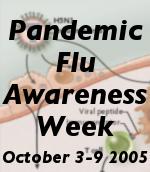I don't even know where to start on this one.
WASHINGTON (CNN) -- President Bush said Tuesday that the possibility of an avian flu pandemic is among the reasons he wants Congress to give him the power to use the nation's military in law enforcement roles in the United States. [emphasis mine]
Nor do I know quite what to make of the fact that, as of 2:48 a.m. (Eastern US time) Wednesday, October 5, CNN.com's QuickVote Reader Poll indicates that just over half (54%) of the 35,309 respondents answered "yes" to the question:
Should there be a U.S. law enforcement role for the military during domestic emergencies? The disclaimer at the bottom -- about how the "QuickVote is not scientific and reflects the opinions of only those Internet users who have chosen to participate" and doesn't represent the opinion of the public at large -- just doesn't reassure me overmuch.
Are 19,009 people just nuts?
What he's talking about here is doing away with, or at least ripping to shreds, a highly excellent federal law enacted in 1878 to limit the US government's ability to use its military for law enforcement types of actions -- to prevent it from imposing a so-called "police state." It's called the
Posse Comitatus Act, and it already grants the President the ability to waive the law during certain emergencies and exceptional circumstances. The military is
already allowed to provide support and assistance in certain circumstances. Our president is not talking here about utilizing one of the several useful and appropriate exceptions to the law; he's talking about asking Congress to give him the power, essentially, to declare martial law.
And maybe it's just me, but I don't think that he's talking about bringing in the Marines to instruct us about proper handwashing techniques to prevent transmission of disease, or to somehow support the ailing Public Health infrastructure. They're not going to be bringing us chicken soup and ginger ale or fluffing our pillows.
But it's not just me: the CNN article quotes
Mr. Gene Healy, a senior editor at the
Cato Institute [more about the
Cato Institute], and he seems concerned too. In an
article posted Sept. 27, Healy notes that in his Sept. 15 post-Katrina TV address (which I guess I must've missed), our President gave the aftermath of Hurricane Katrina as a reason to make provisions for "greater federal authority and a broader role for the armed forces". And then you get the chair of the Armed Services Committee, Sen. John Warner (R-Va) explicitly suggesting the weakening of restrictions on the government's ability to use the military as a police force, and then Pentagon spokesman Lawrence DiRita calling Posse Comitatus "very archaic" and saying it somehow undermines the president's ability to respond to a crisis. "Not so," says Healy:
"The Posse Comitatus Act is no barrier to federal troops providing logistical support during natural disasters. Nor does it prohibit the president from using the army to restore order in extraordinary circumstances--even over the objection of a state governor.
What it does is set a high bar for the use of federal troops in a policing role. That reflects America’s traditional distrust of using standing armies to enforce order at home, a distrust that’s well-justified."
Yep.
[PS: I guess I should have read some more stuff before I posted:
Magpie is already all over this one, as are the good folks at
Effect Measure and I think Susie over at
Suburban Guerilla mentioned it earlier, too.
 ant - Any of various social insects of the family Formicidae, characteristically having wings only in the males and fertile females and living in colonies that have a complex social organization. [Kingdom: Animalia, Phylum: Arthropoda, Class: Insecta, Order: Hymenoptera, Suborder: Apocrita Superfamily: Vespoidea, Family: Formicidae]
ant - Any of various social insects of the family Formicidae, characteristically having wings only in the males and fertile females and living in colonies that have a complex social organization. [Kingdom: Animalia, Phylum: Arthropoda, Class: Insecta, Order: Hymenoptera, Suborder: Apocrita Superfamily: Vespoidea, Family: Formicidae]


